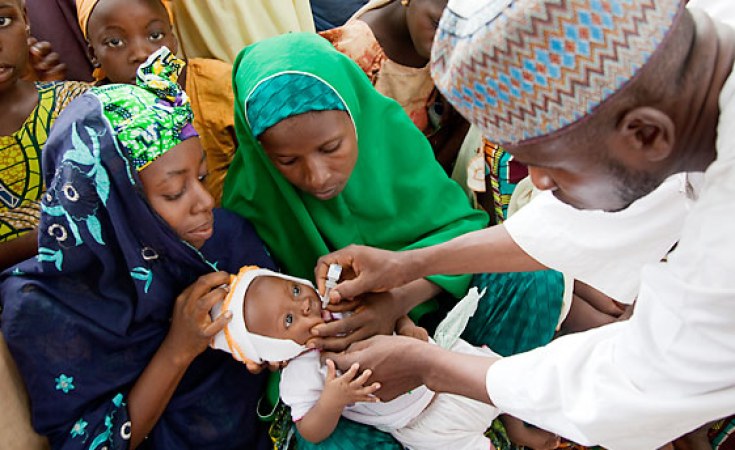Nigeria's first-ever national vaccine summit ended in mid-April with a federal government commitment to expand the country's vaccination programme to help reduce the country's child mortality rates - the second highest child death rate in the world.
Currently, a million children a year die in Nigeria from diseases that could be prevented through vaccines. In 2010, 69 percent of Nigerian children received vaccinations. The new target aims to achieve 90 percent vaccine coverage over the next 10 years.
Studies show that scaling up new and existing vaccines to 90 percent coverage could save more than 600,000 Nigerian children in the next 10 years, and eventually add an economic value equivalent to U.S.$17 billion to the nation's economy.
The details of how to realize this ambitious goal are still a work in progress, but achieving this target is possible, said Dr. Orin Levine, executive director of the International Vaccine Access Center (Ivac) at the Johns Hopkins Bloomberg School of Public Health who took part in the meeting.
"Our report examined the barriers that face the immunisation programme and how to overcome them," Levine told AllAfrica. "These ideas came from Nigerians, not from us, and represent a set of packages that could be incorporated."
The Ivac study, conducted in collaboration with the government of Nigeria, outlined a number of measures that could be adopted to overcome the obstacles that currently undermine the health system and prevent children from receiving vaccines.
Currently, the availability of vaccines and ensuring access to them varies widely across Nigeria's 36 states, and vaccine stock-outs remain a critical issue.
One of biggest challenges is the size of country. While the federal government has given its commitment to improving vaccine coverage, the challenge is to ensure rollout at state and local government level.
"It's one thing to have buy-in from federal government, it's another thing to have buy-in and commitment from all levels," said Levine. "It may seem patently obvious, but for improvements in routine immunisation coverage, one of the important steps is to get local government authorities much more involved and accountable."
Levine is convinced it can be done. "We have evidence from other countries, such as Brazil, which is also very large and heterogeneous, but which has high immunisation coverage. One of the ways they structure their programme is that they make municipalities accountable for programmes. Essentially, the mayor is on the hook for the level of immunisation coverage that is achieved."
In 2008, 36 percent of Nigerian women reported that the distance to a health facility was an obstacle to seeking medical care. The study also found that distance to a health facility was the primary reason that mothers gave for failing to vaccinate their children under five years of age. Addressing transport issues - or devising schemes that provide vehicles to deliver vaccines - were among the solutions discussed during the meeting.
Where funding for an expanded vaccine programme would be a serious obstacle in other, poorer African countries, such a programme is within Nigeria's means.
"Nigeria has arguably the greatest human resources available of any African country," said Levine. "They have tremendous financial resources, but what they need now, and what we think is beginning to emerge, is the political will and commitment to make strong routine immunisation systems a priority."
Nigeria's first lady, Patience Jonathan, called on all levels of society to support the vaccine initiative. Speaking at the summit, Jonathan said, "With over one million Nigerian children dying each year from conditions that can easily be prevented by vaccination, we all would be failing in our duties as mothers, parents and leaders in the various segments of our society if we don't take this advantage to do something concrete."
Levine believes that the summit is "the most significant opportunity we've had in the past decade to get high-level Nigerian political will focused on this issue".
Success will not only benefit Nigerian children but will also save the lives of other children in the region.
"As the most populous country in Africa, what happens in Nigeria has influence and impact throughout the region," said Levine. "So it would be tremendous on so many levels if Nigeria could lift up its immunisation coverage substantially over the next decade."


